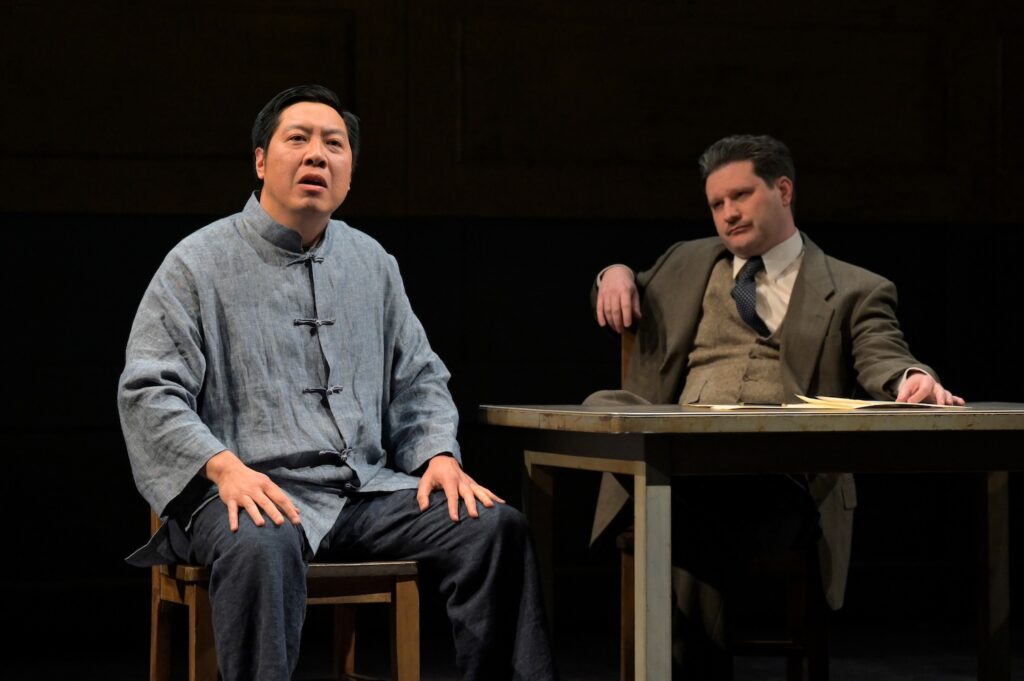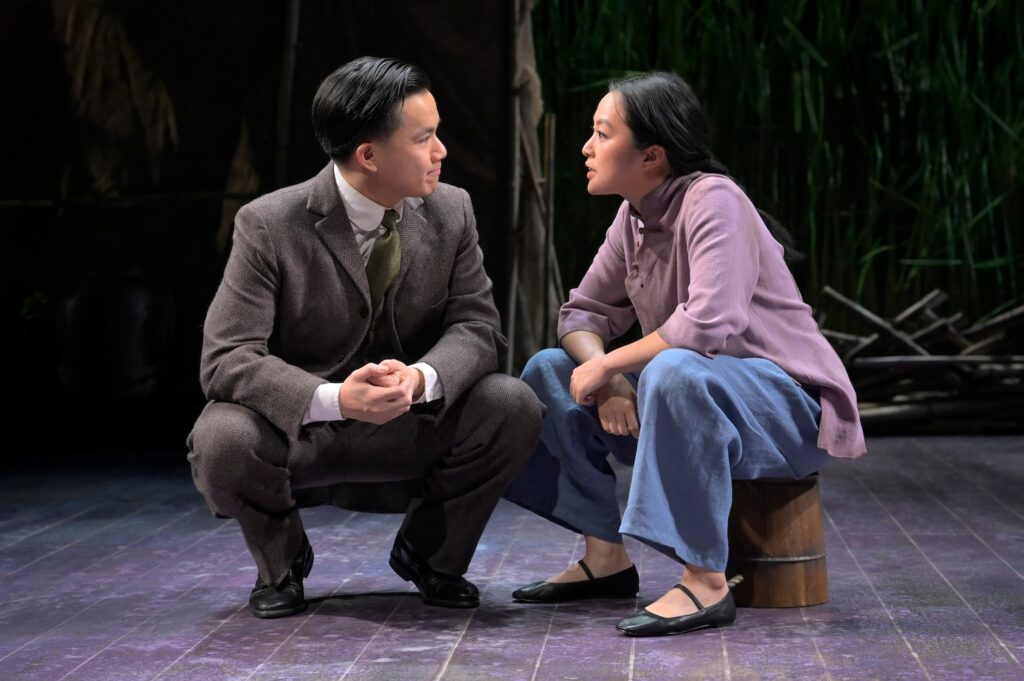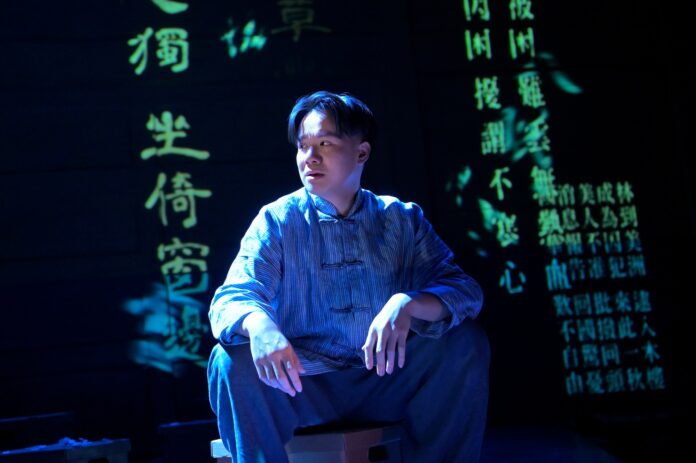The phrase “hurt people hurt people” isn’t simply an empty platitude; it’s an uncomfortable reminder that the damage of abuse is transitive. Whether a parent abusing a child so that the child grows up to abuse their own children or the pain passed down to marginalized groups after lifetimes of their ancestors being oppressed, breaking the cycle of abuse can often be harder than going through the abuse itself because it involves reprogramming from thinking “It’s always been this way and always will”.
Lloyd Suh’s The Far Country (West Coast premiere through April 14 at the Berkeley Rep) is about the lingering effects of systemic racism, made all the worse when those effects are passed on to those whom the abused should be helping. We begin in SF in 1909, just after the Chinese Exclusion Act has been passed. In a room that looks much like the warehouse from Raiders of the Lost Ark, a middle-aged Chinese American man named Gee (Feodor Chin) is being interrogated. He owns and operates a laundry shop. He says that he’s married with two sons and one daughter—all of whom supposedly live in China with their mother. He wants to visit them before returning to the US to resume his business, which is vital to the community.
Every word, every syllable, and every gesture from Gee is scrutinized by an uncaring American official (Jonathan Rhys Williams). There’s no presumption of innocence for this hard-working citizen—he’s guilty of the unforgivable sin of ethnicity. Nothing he says will make him free of this scrutiny for the sake of “national security,” nor will anyone be able to help him; not even the translator who clearly empathizes with Gee’s plight.

Then, something unexpected happens. It’s one year later and we’re transported to Gee’s home village in Taishan, China. He did make it out of that room no worse for wear, but one could still say he’s damaged from the experience. You see, Gee—and I’m saying this as best I can not to spoil the overall story—isn’t here to break the cycle in which he’s caught; he’s here to repeat it.
He meets a woman named Low (Tess Lina) who’s heard the stories of Chinese shipped to the States like so much cargo. Gee needs someone to work at his laundry and he finds a healthy young man like Low’s son, Moon Gyet (Tommy Bo), to be the perfect candidate. Low, having little more than the land on which she stands, reluctantly agrees to let her son go to the States under the guardianship of his new “father,” with the promise that she’ll be sent money.
What follows is a Kafka-esque nightmare of racial profiling and bureaucratic red tape from which Moon will seemingly never escape. It’s one of the two most powerful sequences in Lloyd Suh’s script (excellently directed by Jennifer Chang) because it’s gripping in its portrayal of being caught in a machine from which there appears no escape. In another story, Moon Gyet’s time on Angel Island would be akin to Charlie Chaplin being shuffled around by gears in Modern Times. But this is no comedy, nor is Gyet simply overwhelmed by a world changing without him. Rather, he’s under attack by a system (again, this is the US under the Chinese Exclusion Act) that’s actively out to crush. Gee, we learn, not only knew this, but sincerely believed he was doing the kid a favor by throwing him into the deep end of the shark tank.
Further spoilers make me hesitant to reveal the other most-powerful moment of the play, but it’s a quiet scene in which the US is described as “vast, but it feels crowded”. It’s a moment in which we watch the cycle repeat once again, as if we the audience and the characters are caught in an inescapable time loop. Cycles of abuse are like that.

Though the script doesn’t quite stick the landing—opting for an ending a bit too optimistic, given all that comes before—Chang has an excellent cast at her disposal and the best of Berkeley Rep’s tech crews to bring Suh’s nightmarish history lesson to life. In addition to the cast already mentioned, one also shouldn’t forget the Bay Area’s own Sharon Shao as a no-bullshit woman who seems to dive into her situation head-first and with her eyes open. The characters on all sides of the ensemble are people who know their function in the machine, and serve it fully, despite delusions of doing good work. Eventually, everyone falls into an “out for No. 1” attitude that keeps the machine operating at an unbroken pace.
Help us save local journalism!
Every tax-deductible donation helps us grow to cover the issues that mean the most to our community. Become a 48 Hills Hero and support the only daily progressive news source in the Bay Area.
As usual, I went to the Rep during one of its mask-required Sunday matinees (also required for their Tuesday shows). The house was full of a mostly-elderly cast who seemed good about keeping their masks on for both acts of the play. My Aranet4’s CO² readings appeared to peak around 1037ppm, which isn’t bad for a large venue with a full house.
When you’ve been around as many parents as I have, you get to hear the debate over spanking several times over. Those who favor it truly believe that it was the only way to “straighten [themselves] out”, despite having almost no evidence to support this (not even anecdotally). Those against can often fall back on evidence that spanking—like “enhanced interrogation”—does little more than literally beat subservience into someone, not improve them.
The characters who come before and after Gee are those who believe that “tough love” is the best medicine, leading Gee himself to believe it. The sadness of Suh’s story is in seeing the damage wrought from thinking that feeding into a cycle will somehow break it. It’s a psychologically trying story that needs to look no further than one century ago in US history (in SF, no less). Despite a weak ending, it’s a strong story for which the most disturbing realization is that very little has changed in the hundred-plus years since these characters lived.
The cycle has yet to be broken.
THE FAR COUNTRY’s West Coast premiere runs through April 14 in the Peet’s Theatre of the Berkeley Rep. Tickets and further info here.





